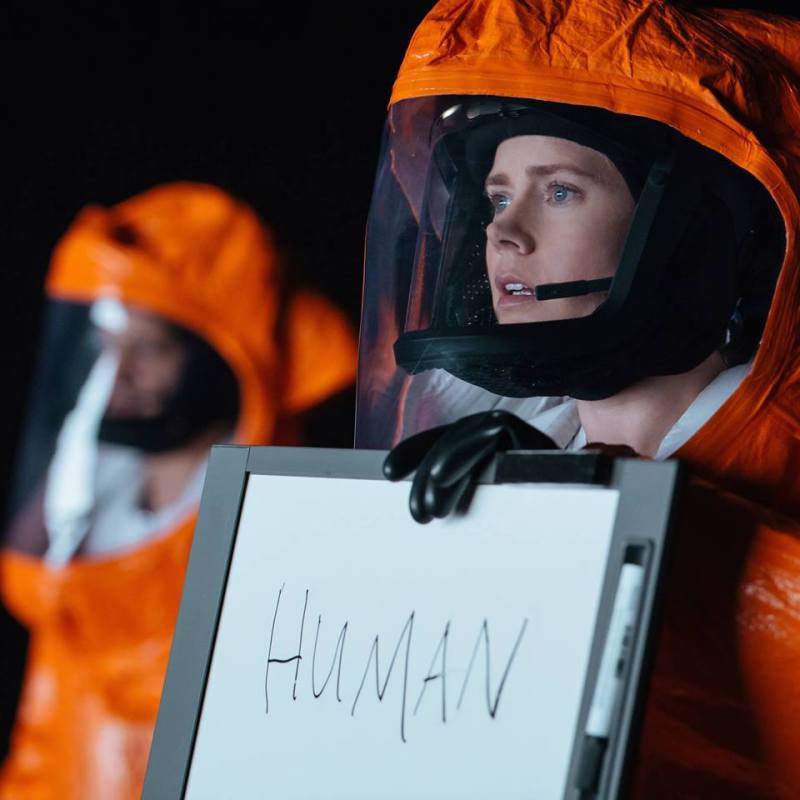So… it feels weird writing a review two days after the Election. As if anything else that happens this week is remotely as consequential as that event. But I can’t not produce content. I signed a contract and everything.
The good news is “Arrival” is quite excellent. I considered director Denis Villeneuve’s previous film “Sicario” to be one-notch below cinematic perfection. This is more like three notches, but that’s still quite good. And if you are of a particular persuasion (especially if you are hungering for a big-budget film where the heroes are all college professors), I could easily see this being your favorite film of the year.
It’s certainly Villeneuve’s most mainstream and most expansive film. In “Arrival,” 12 massive obelisks land on various remote corners of the globe, triggering a worldwide panic, as the people of the Earth rush to make contact with our extra-terrestrial visitors. This is where Dr. Louis Banks comes in, as played by Amy Adams. She slays playing a highly restrained woman, who somehow conveys so much with nothing more than a wary eye and a hushed, determined voice. An expert linguist, Dr. Banks is brought in by the American military to help them decipher the extraterrestrial’s language. The fact that the American military responds to the presence of aliens by trying to communicate with them, rather than punching them in the face, should indicate what type of film “Arrival” is: A big-budget alien-invasion film where everything – from the melancholic, gray color palette to the faint, atonal score – has been muted.
It’s the alien-invasion movie as an intimate character study, as Dr. Banks tries to cope with the stress of deciphering the alien’s language while dealing with the memory of her deceased daughter. It’s a job that isn’t made any easier by the fact that the Americans aren’t the only ones trying to determine what these beings are saying. The Russians, the Chinese, and a whole host of other nations are all also desperately scrambling to determine these creature’s intentions. Why are they here? What do they want? Do they have weapons? And if so, are they willing to give them to us first?
This last question should make the unique setup of this film’s cat-and-mouse game readily apparent. It’s a shame then that the film feels so disinterested in actually following through on this. “Arrival” has a remarkably strong beginning, where Villeneuve hones in on how everyone’s daily order is disrupted by the arrival of these creatures. He gives so much space to the tense moments of human beings rushing to return home after the news of the arrival first breaks or calling their loved ones and family members to make certain that they are okay – that he puts every other Hollywood director’s casual treatment of the fantastical to shame. And the film concludes with rarest of things, a twist-ending that is not only clever, but deeply emotional affecting.
But the middle section, the part where Banks has to decipher the alien’s crypto-language – never quite clicks. Maybe it’s because the film skips over several key developments in this arduous process through a distracting montage. Maybe it’s because we never get a sense of what is driving the other world leaders America is competing against. Maybe it’s because Dr. Banks is ultimately a pacifist, and more than any other character in the film, she is willing to take her time working with the aliens, rather than rush to do anything.
But maybe it’s because Villeneuve is only partially the right director for this material. For a work revolving around a global event, “Arrival” is ultimately a very intimate, very emotional, possibly even uplifting work. And I don’t know if Villeneuve’s heart was fully into that. He certainly seemed to get much more of a perverse kick from systematically dismantling all of his heroine’s hopes and desires in “Sicario” than he does from building up Dr. Banks’ resolve and courage in this movie. Maybe this is why so many of the shots of Dr. Banks reminiscing about happier times with her daughter proved so distracting for me. They’re clichéd, in a way that implies that Villeneuve couldn’t think of an original way to portray happiness, and ultimately had to copy it from someone else (in this case, it seems like he was going for Terrence Malick Lite).
But “Arrival” certainly isn’t the first Hollywood feature to sag a little in the middle. And the film gets so much right, I am almost willing to overlook its flaws. The score and cinematography were excellent. The performances are riveting. And most, if not all, of the scenes really worked. So ultimately, let’s call “Arrival” a smart, well-crafted, optimistic piece of brainy, popcorn entertainment. An enjoyable distraction, if you currently need that in your life.
Contact Raymond Maspons at raymondm ‘at’ stanford.edu.
